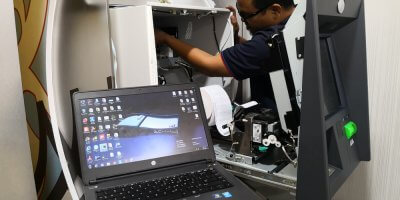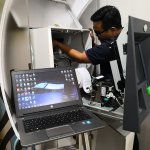
SaaS is a great way for businesses to explore cloud computing. Source: Shutterstock
Are SaaS applications the key to cloud computing for small businesses?
SMALL BUSINESSES struggle to move to the cloud despite the many benefits it offers.
When think tanks poll small business owners about cloud computing, interest seems high but lack of skills and knowledge seem to hinder adoption.
As a result, many experts believe that the best way for small businesses to gain familiarity with cloud computing and benefit from some of what the technology has to offer is for them to explore cloud-based applications — better known as Software as a Service (SaaS) applications.
SaaS allows small businesses to gain access to high-end business software without making a big upfront investment or a long-term commitment.
Further, SaaS applications are often quite secure as the vendors, usually big technology giants, are required to adhere to data protection and privacy standards and enlist specialists to secure their cloud-based deployments.
In many cases, vendors offering SaaS-based applications understand that small businesses need help with customizing the solution for their own purposes, and hence, offer extensive training and support for free online and in-person, for a small fee, through partner organizations.
Truth be told, SaaS applications are growing rapidly today, and IDC forecasts that SaaS will be the largest category of cloud computing, capturing more than half of all public cloud spending between 2018 and 2023.
Given that the cloud computing market is expected to grow at a compounded annual growth rate (CAGR) of 22.3 percent between 2018 and 2023 and touch nearly US$500 billion by the end of the 5 year period, SaaS is expected to see revenues cross US$250 billion soon.
While mid-sized businesses are expected to account for 16 percent of the worldwide total for cloud computing, small business will be behind by only a few percentage points says IDC.
Overall, there’s a lot of interest in the market when it comes to SaaS applications — and small businesses stand to gain a lot from jumping onto the bandwagon and getting started with SaaS.
Here are three areas where SaaS applications can really help small businesses implement and understand cloud computing quickly and effectively:
# 1 | ERP and CRM
Some of the largest ERP and CRM vendors moved to the SaaS market a couple of years ago and have never looked back.
ERP and CRM solutions tend to perform exceptionally on SaaS models because they enable companies to integrate the applications with other tools quite effortlessly, usually via APIs, delivering better value instantaneously.
Given the experience ERP and CRM vendors have with traditional businesses, they tend to provide extensive online and offline support to customers to rope them in for the long-term and upsell them on other solutions that complement their packages.
Since most small businesses exploring SaaS applications and cloud computing don’t have a data platform, a good ERP or CRM application can serve as the first step to digitizing their records and helping them go digital quickly and effortlessly.
# 2 | Accounting
SaaS-based accounting software is one of the first choices for most companies exploring the cloud.
In many cases, the choice is driven by a push from accountants who want to help client organizations maintain better records and streamline the auditing and tax filing processes.
Businesses in Singapore, Australia, and other parts of the world also explore SaaS-based accounting packages because of regulatory requirements, although small businesses are sometimes provided with exemptions to help them cope with the pace of digitization and the cost of implementation.
Small businesses that choose SaaS-based accounting packages not only gain from simpler record keeping and better accounting services but are also able to digitize their sales processes and automate their invoicing, payroll, and other functions.
SaaS definitely makes accounting easy for small businesses.
# 3 | Data storage and backup
Going digital means collecting and storing data in the digital world.
SaaS-based applications make it easy for businesses to safeguard that data by storing it in secure vaults online and backing it up on secure servers.
Contrary to what many small business owners believe, storing data on the cloud via SaaS applications is not only more secure but also quite cost-effective if done properly.
When backing up, companies need to make a choice about how frequently they will need to access the data. If it’s not often, they can save more by archiving data instead of saving it on standard servers.
Overall, when the right decisions are made, and with a little help from vendors, small businesses can gain a lot from online SaaS-based data storage and backup solutions.
READ MORE
- Safer Automation: How Sophic and Firmus Succeeded in Malaysia with MDEC’s Support
- Privilege granted, not gained: Intelligent authorization for enhanced infrastructure productivity
- Low-Code produces the Proof-of-Possibilities
- New Wearables Enable Staff to Work Faster and Safer
- Experts weigh in on Oracle’s departure from adland




